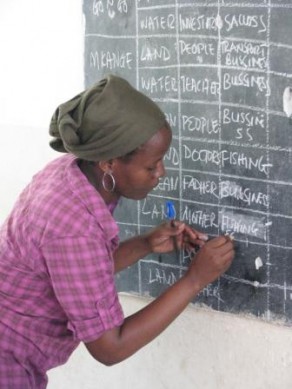The Kesho Trust was invited to attend a recent information workshop regarding research on the links between population and the environment. A local volunteer with Kesho Trust, Beatrice Simon, who has worked with us in Saadani [in photo] and in Kiteto District attended on our behalf. We are grateful to Beatrice for her participation. Her report on the workshop follows:
Demographic Dividend –Workshop for Environmental Organizations
 I was fortunate to be able to represent the Kesho Trust at a workshop conducted at Flomi Hotel in Morogoro, Tanzania. Hosted by Pathfinder International the workshop focused on the interrelationship between population and various socio-economic sectors such as environment and how population impacts these sectors and the Sustainable Development Goals. A variety of Tanzanian environmental organizations were invited. Pathfinder is an organization that removes barriers to critical sexual and reproductive health services in developing countries, ensuring millions of women, men and young people are able to choose their own paths forward.
I was fortunate to be able to represent the Kesho Trust at a workshop conducted at Flomi Hotel in Morogoro, Tanzania. Hosted by Pathfinder International the workshop focused on the interrelationship between population and various socio-economic sectors such as environment and how population impacts these sectors and the Sustainable Development Goals. A variety of Tanzanian environmental organizations were invited. Pathfinder is an organization that removes barriers to critical sexual and reproductive health services in developing countries, ensuring millions of women, men and young people are able to choose their own paths forward.
The workshop was useful for me because I gained important knowledge on the relationship between environment and population. Worldwide population is still increasing while the resources remain the same. Population growth hinders economic opportunities as a result of high child dependency. This is true because most people especially in rural areas do not use family planning often due to factors such as lack of education. Socioeconomic growth through managing demographics can be achieved through reducing the child dependency burden and improving human capital through investment in health and education. When birth rates declinesignificantly, there will be more working-aged adults, which will open the window of opportunity for accelerating economic growth through increased productivity.
Also underemployment as a result of high population will be reduced when countries, particularly developing countries, invest in different sectors such as agriculture and industrialization. This investment is accentuated through the multiplier effect. Education, health, family planning, and economic reforms are important wheels in achieving population stability and dividends. Different organization and stakeholders should encourage education, particularly female school enrollment and use of family planning in order to reduce child dependency. Family planning reduces child dependency and the burden of catering for children hence enhance economic growth. These principles and implications of population profiles are important for organizations such as The Kesho Trust especially as it works to enhance education and sustainable livelihoods for the local people in the villages where we work.
